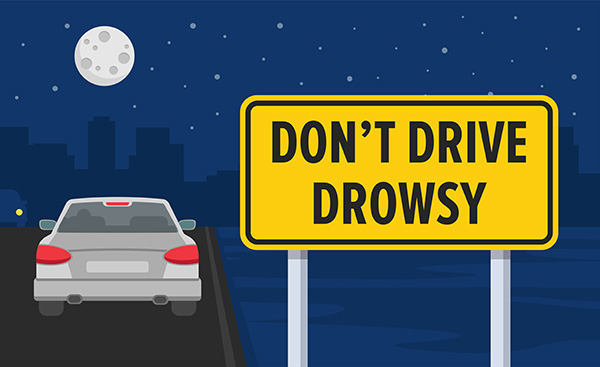
We've all experienced that familiar feeling of your eyelids drooping, and your focus begins to waver. The road ahead seems endless, and the car becomes your bed. Drowsy driving is more common than we'd like to admit, and it's one of the leading causes of accidents on the road. But here's the good news—you don't have to fall victim to it. By making a few conscious decisions, you can keep yourself alert and safe behind the wheel. Let's dive into seven essential tips to prevent drowsy driving so you can enjoy your journey without the risk.
1. Prioritize a Good Night's Sleep
This might seem obvious, but it's often overlooked. The most effective way to prevent drowsy driving is to ensure you're well-rested before getting behind the wheel. Adults typically need between 7-9 hours of sleep each night to function optimally. Skimping on sleep, even by just a couple of hours, can have a significant impact on your alertness and reaction time.
When planning a road trip or even a long commute, make sure to get a full night's sleep beforehand. If you're consistently missing out on sleep, your body will accumulate a "sleep debt," making it harder to stay awake and alert. Prioritizing sleep isn't just about feeling refreshed—it's about ensuring you have the mental and physical energy to drive safely.
2. Take Regular Breaks During Long Drives
If you're embarking on a long journey, don't push yourself to drive for hours on end without a break. It's essential to stop every couple of hours to stretch your legs, grab a snack, and clear your head. Even a short break can significantly reduce your risk of drowsy driving.
Rest areas and service stations are there for a reason—use them! Step out of the car, walk around, and give your body a chance to re-energize. If you're traveling with others, consider taking turns driving so that everyone has a chance to rest. The key here is to break up the monotony of driving and give your brain a chance to reboot.
3. Stay Hydrated and Eat Smart
What you consume can have a big impact on your alertness. Dehydration can make you feel tired, so keep a bottle of water handy and sip regularly throughout your drive. Avoid sugary drinks and excessive caffeine, which can lead to energy crashes later on. Instead, opt for water or a light, unsweetened beverage to keep yourself hydrated.
When it comes to food, avoid heavy, carb-laden meals before or during your drive. These can make you feel sluggish and sleepy. Instead, choose light snacks like fruits, nuts, or yogurt that provide sustained energy without weighing you down. Keeping your body fueled with the right nutrients will help you stay focused and alert on the road.
4. Use Caffeine Wisely
Caffeine can be a helpful tool in staying awake, but it's important to use it wisely. A cup of coffee or tea can boost your alertness for a short period, but it's not a substitute for sleep. If you're feeling drowsy, a dose of caffeine might help you get to your next rest stop, but don't rely on it to keep you awake for hours.
Keep in mind that the effects of caffeine can vary from person to person, and it can take about 30 minutes to kick in. If you do choose to drink coffee or tea, make sure it's early enough in your journey to be effective, and be aware that consuming too much can lead to jitters and a subsequent crash, which can be just as dangerous as drowsiness.
5. Recognize the Signs of Drowsiness
One of the most important steps in preventing drowsy driving is recognizing the signs early. If you find yourself yawning frequently, blinking excessively, or struggling to keep your head up, these are red flags that you need to stop and rest. Other signs include drifting in and out of your lane, missing road signs or exits, and having difficulty remembering the last few miles you've driven.
It's crucial to take these signs seriously. Drowsy driving can quickly lead to microsleeps—brief moments where your brain essentially shuts down, and you lose control of the vehicle. If you notice any of these symptoms, it's time to pull over and rest, even if you think you can push through.
6. Avoid Driving During Sleepy Hours
Our bodies are naturally programmed to feel sleepy at certain times of the day, particularly in the early afternoon and late at night. These are the times when your body's circadian rhythm is at its lowest, making you more prone to drowsiness.
If possible, try to avoid driving during these peak sleepiness hours. If you must drive during these times, be extra vigilant and aware of your body's signals. Consider pulling over for a quick nap if you start to feel the effects of drowsiness creeping in. Your destination will still be there when you arrive safely.
7. Consider a Power Nap
Sometimes, the best way to combat drowsiness is to embrace it—temporarily, that is. If you're feeling too tired to drive safely, pull over to a safe location and take a short nap. A 15-20 minute power nap can do wonders for your alertness, providing you with the energy boost you need to continue your journey.
However, it's important to set an alarm to avoid falling into a deeper sleep cycle, which can leave you feeling groggy. After your nap, take a few minutes to fully wake up and reorient yourself before hitting the road again. A short nap can make all the difference in helping you drive safely and alertly.
Don't let a lack of maintenance put you at risk on the road. Schedule a visit with Future Auto Service today and ensure your vehicle is prepared for any journey, no matter how long.